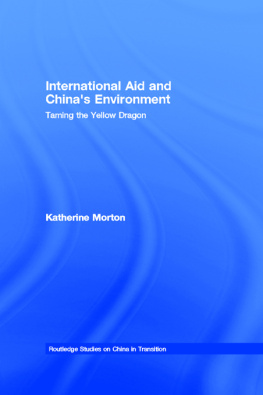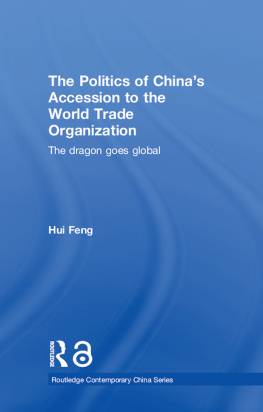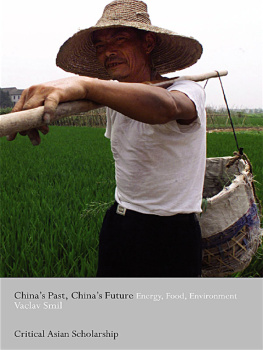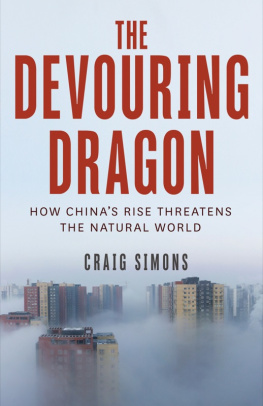International Aid and Chinas Environment
Rapid economic growth in the worlds most populous nation is leading to widespread soil erosion, desertification, deforestation and the depletion of vital natural resources. The scale and severity of environmental problems in China now threaten the economic and social foundations of its modernization.
International Aid and Chinas Environment analyses the relationship between international and local responses to environmental pollution problems in China. The book challenges the prevailing wisdom that weak compliance is the only constraint upon effective environmental management in China. It makes two contributions. First, it constructs a conceptual framework for understanding the key dimensions of environmental capacity. This is broadly defined to encompass the financial, institutional, technological and social aspects of environmental management. Second, the book details the implementation of donor-funded environmental projects in both Chinas poorer and relatively developed regions. Drawing upon extensive fieldwork, it seeks to explain how, and under what conditions, international donors can strengthen Chinas environmental capacity, especially at the local level. It will be of interest to those studying Chinese politics, environmental studies and international relations.
Katherine Morton is a Fellow in the Department of International Relations, Research School of Pacific and Asian Studies at the ANU in Australia.
Routledge Studies on China in Transition
Series Editor: David S. G. Goodman
1 The Democratisation of China
Baogang He
2 Beyond Beijing
Dali Yang
3 Chinas Enterprise Reform
Changing state/society relations after Mao
You Ji
4 Industrial Change in China
Economic restructuring and conflicting interests
Kate Hannan
5 The Entrepreneurial State in China
Real estate and commerce departments in reform era Tianjin
Jane Duckett
6 Tourism and Modernity in China
Tim Oakes
7 Cities in Post Mao China
Recipes for economic development in the reform era
Jae Ho Chung
8 Chinas Spatial Economic Development
Regional transformation in the lower Yangzi delta
Andrew M. Marton
9 Regional Development in China
States, globalization and inequality
Yehua Dennis Wei
10 Grassroots Charisma
Four local leaders in China
Stephan Feuchtwang and Wang Mingming
11 The Chinese Legal System
Globalization and local legal culture
Pitman B. Potter
12 Transforming Rural China
How local institutions shape property rights in China
Chi-Jou Jay Chen
13 Negotiating Ethnicity in China
Citizenship as a response to the state
Chih-yu Shih
14 Manager Empowerment in China
Political implications of rural industrialisation in the reform era
Ray Yep
15 Cultural Nationalism in Contemporary China
The search for national identity under reform
Yingjie Guo
16 Elite Dualism and Leadership Selection in China
Xiaowei Zang
17 Chinese Intellectuals Between State and Market
Edward Gu and Merle Goldman
18 China, Sex and Prostitution
Elaine Jeffreys
19 The Development of Chinas Stockmarket, 19842002
Equity politics and market institutions
Stephen Green
20 Chinas Rational Entrepreneurs
The development of the new private business sector
Barbara Krug
21 Chinas Scientific Elite
Cong Cao
22 Locating China
Space, place, and popular culture
Jing Wang
23 State and Laid-Off Workers in Reform China
The silence and collective action of the retrenched
Yongshun Cai
24 Translocal China
Linkages, identities and the reimagining of space
Tim Oakes and Louisa Schein
25 International Aid and Chinas Environment
Taming the Yellow Dragon
Katherine Morton
First published 2005
by Routledge
2 Park Square, Milton Park, Abingdon, Oxon OX14 4RN
Simultaneously published in the USA and Canada
by Routledge
270 Madison Ave, New York, NY 10016
Routledge is an imprint of the Taylor & Francis Group
2005 Katherine Morton
This edition published in the Taylor & Francis e-Library, 2006.
To purchase your own copy of this or any of Taylor & Francis or Routledges collection of thousands of eBooks please go to www.eBookstore.tandf.co.uk.
All rights reserved. No part of this book may be reprinted or reproduced or utilised in any form or by any electronic, mechanical, or other means, now known or hereafter invented, including photocopying and recording, or in any information storage or retrieval system, without permission in writing from the publishers.
British Library Cataloguing in Publication Data
A catalogue record for this book is available from the British Library
Library of Congress Cataloging in Publication Data
A catalog record for this book has been requested
ISBN 0415378206 (Print Edition)
Preface
This is a book about the relationship between international and local responses to environmental problems in China. It seeks to determine the effectiveness of international environmental aid by exploring the linkages between different donor approaches and local capacity. To a certain extent, the study was motivated by the theoretical debate over the role of the market versus citizen participation in environmental management. I was interested in finding out how these ideas could translate into practice in the context of a developing country that was undergoing considerable economic and social change. However, my initial theoretical inquiry soon became overshadowed by practical considerations and, in particular, the problem of weak local capacity. I became convinced that, in the case of China, the promotion of market or participatory values via the processes of international aid was not enough to bring about an improvement in environmental management. Instead, it seemed to me that both international donors and the Chinese government needed to focus more of their attention upon developing environmental capacity at the local (provincial, municipal and country level).
When I began the research in 1997 my initial inquiries led me to seriously reconsider the task that I had set myself. At the time, the Chinese government was still ill at ease with placing too much emphasis upon environmental protection. It was seen by many government officials as an unaffordable luxury. Although China appeared to be taking the environment seriously at the international level through its participation in environmental negotiations, it remained deeply sceptical of the motives of international donors. In the eyes of the Chinese government, environmental assistance was double edged. It offered much needed financial and technical assistance but, at the same time, provided richer nations with political leverage over Chinas future economic development. Scepticism appeared to run even deeper at the local level where hard evidence confirmed that economic realities far outweighed environmental concerns.












